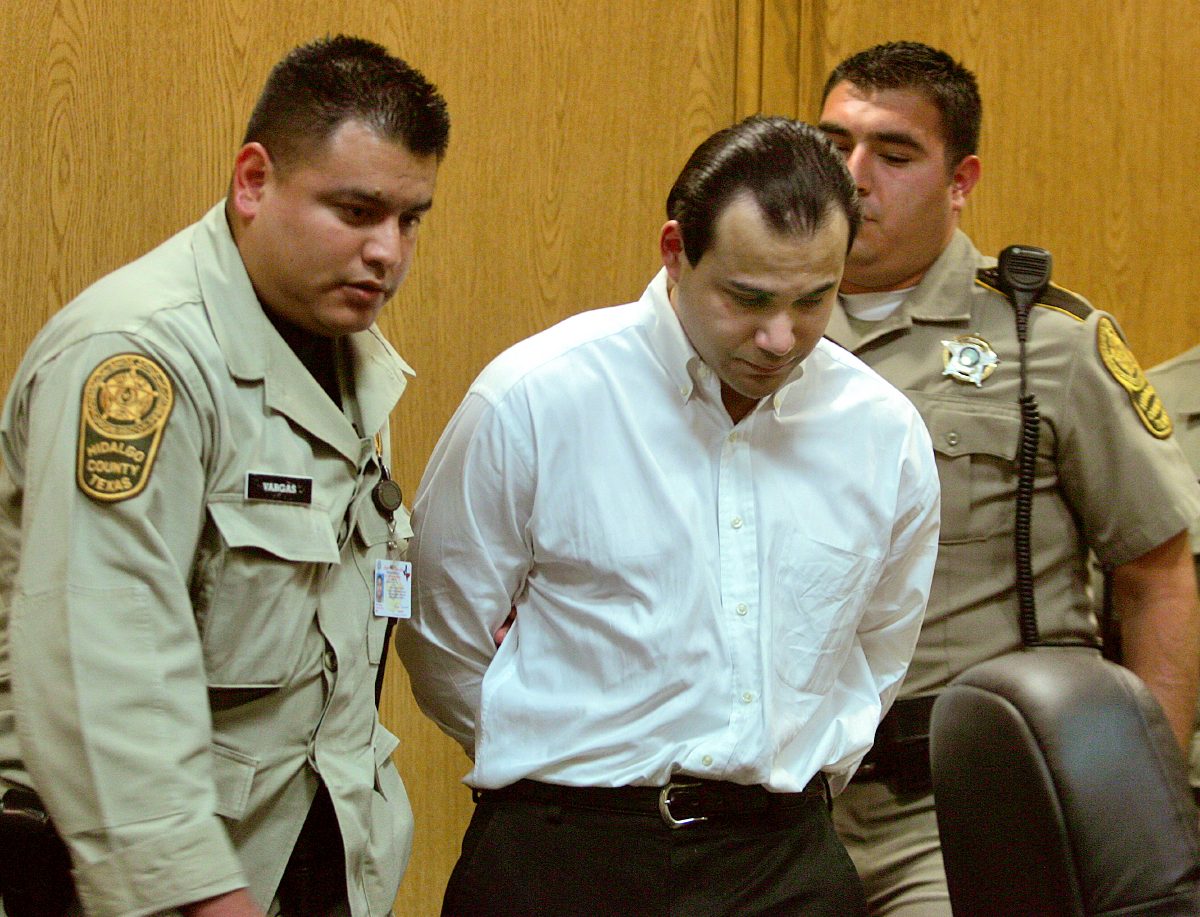
A motion requesting a 90-day continuance in the death penalty case against convicted child killer John Allen Rubio was partially denied earlier this month by U.S. District Judge Fernando Rodriguez Jr.
The Texas Department of Criminal Justice requested a Feb. 14, 2023, deadline. On Nov. 2, Rodriguez granted the continuance but only until Jan. 20, 2023, federal court documents reveal.
Next year will mark 20 years since the three children — ages 3 and under — were decapitated in one of the most heinous crimes committed in Brownsville.
A jury in 2010 found Rubio guilty in the March 11, 2003, beheading of Julissa Quesada, 3, John E. Rubio, 14 months, and Mary Jane Rubio, 2 months, the three children of his common-law wife Angela Camacho. John Allen Rubio fathered Mary Jane but treated all children as his own.
The bodies of the children were found inside their apartment on Eighth and Tyler Streets, about a block away from where Rubio’s first capital murder trial took place. The apartment building has since been torn down and replaced with a community garden.
Rubio admitted to killing his children, saying he thought they were possessed by the spirit of his dead grandmother, court documents reflect. He and Camacho had discussed burying the childrens’ bodies and fleeing to Mexico, authorities said.
His attorneys have filed two petitions in his death penalty case claiming that Rubio’s appointed defense in his murder trial did not represent him properly and that his case was handled by a district attorney that was steeped in scandal and misconduct.
Rodriguez’s order states, “respondent Bobby Lumpkin shall file his responsive pleading to Petitioner John Allen Rubio’s Second Amended Petition for Writ of Habeas Corpus Pursuant to 28 U.S.C. § 2254 (Doc. 61) by no later than January 20, 2023. Absent exceptional circumstances, the Court will not favorably consider any requests for additional time to file a response to Petitioner John Allen Rubio’s Second Amended Petition for Writ of Habeas Corpus Pursuant to 28 U.S.C. § 2254.”
The state filed its motion Oct. 31 and in outlining its request for a continuance stated, “The need for an extension of time is due to the heavy demands of the undersigned’s capital caseload, previously planned vacation time, and the voluminous nature of the documents and record.”
Rubio, 42, a Brownsville native, has been sitting on death row at the Polunsky Unit in Livingston, Texas since his initial conviction in November 2003 and his second conviction on the same counts in 2010.
The Texas Court of Criminal Appeals in 2007 tossed out his initial conviction because statements from his common-law-wife, Angela Camacho, were erroneously allowed into evidence. Rubio was retried in July 2010 and once again found guilty of capital murder.
The state’s motion further stated, “Being unfamiliar with the case, the undersigned’s integrity demands she cite check every factual and legal assertion in addition to updating the prior response with relevant developments and responses. Thus, despite her best efforts, the undersigned is unable to finish her response to the amended petition by the deadline.”
According to the motion, “the undersigned has drafted a response to four of Rubio’s ten claims. But the process is time-consuming. Rubio’s second amended petition is 163 pages.”
The motion goes on to state, “The undersigned understands the Court has been generous with both the initial deadline and the first extension, but the undersigned was completely unfamiliar with this case when it was assigned to her. And while the undersigned would like to complete this answer in less time, she is beholden to multiple other demands.”
The motion concluded with the following, “The undersigned is not asking for this time for mere delay but rather to present this Court with a thorough and well-reasoned response to a complex and lengthy capital case.”
In Rubio’s first petition, filed in September 2020, his attorney filed for a writ of habeas corpus in federal court “declaring unconstitutional and invalid his (Rubio’s) conviction for capital murder as well as the resulting death sentence.”
Rubio’s second amended petition filed in April 2022 said the same.
On Feb. 3, 2021, U.S. District Judge Rolando Olvera Jr., who originally heard the case, granted the temporary stay that allowed Rubio’s legal team to present new court documents citing “new evidence has come to light since state habeas review concluded.”
Although a second writ of habeas corpus was filed with the Texas of Court of Criminal Appeals on Rubio’s behalf, the higher court in January denied his writ. In its ruling the court stated that Rubio failed to satisfy the requirements under Texas law and that his writ was “an abuse of the writ without considering the claims’ merits.”
In an earlier interview, Cameron County District Attorney Luis V. Saenz said, “The Rubio case continues to be a horrific and painful open wound for the community. It screams for finality. As the Court pointed out this is the defendant’s second state writ that the Court has denied. We will now continue working towards having the defendant’s pending federal writ also be denied. The defendant must be held accountable for what he did: murdered and decapitated three innocent children.”
According to a confession Rubio made to police, he admitted to killing the children in 2003 because he believed there was an evil presence in them. He even asked one of the officers first to arrive at the crime scene to place him under arrest, according to the officer’s statement.
Camacho, 42, pleaded guilty to murder in 2005 and was sentenced to life prison and remains in custody at the Christina Melton Crain Unit in Gatesville, Texas. She is eligible for parole March 3, 2043.



